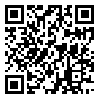Volume 8, Issue 3 (2023)
Manage Strat Health Syst 2023, 8(3): 238-250 |
Back to browse issues page
Research code: 162617145
Ethics code: 162617145
Download citation:
BibTeX | RIS | EndNote | Medlars | ProCite | Reference Manager | RefWorks
Send citation to:



BibTeX | RIS | EndNote | Medlars | ProCite | Reference Manager | RefWorks
Send citation to:
Hashemi Shiri R, Dehghan Tafti M A, Alavirad A, Ghafoori M H. Asymmetric Effects of Exchange Rate Shocks on Urban Household Health Expenditures in Iran. Manage Strat Health Syst 2023; 8 (3) :238-250
URL: http://mshsj.ssu.ac.ir/article-1-644-en.html
URL: http://mshsj.ssu.ac.ir/article-1-644-en.html
1- Ph.D. student of Monetary Economics, Department of Economics, Abarkouh Branch, Islamic Azad University, Abarkouh, Iran
2- Assistant Professor, Department of Economics, Yazd Branch, Islamic Azad University, Yazd, Iran ,madehghan3g@gmail.com
3- Associate Professor, Department of Economics, Yazd Branch, Islamic Azad University, Yazd, Iran
4- Ph.D. student of Health Economics, Department of Health Economics, School of Health Management & Information Sciences, Iran University of Medical Sciences, Tehran, Iran
2- Assistant Professor, Department of Economics, Yazd Branch, Islamic Azad University, Yazd, Iran ,
3- Associate Professor, Department of Economics, Yazd Branch, Islamic Azad University, Yazd, Iran
4- Ph.D. student of Health Economics, Department of Health Economics, School of Health Management & Information Sciences, Iran University of Medical Sciences, Tehran, Iran
Abstract: (1633 Views)
Background: The evidence of Iran's economy shows that many economic variables, including household health expenditures, can be affected by exchange rate shocks. According to previous studies, the increase in the exchange rate from two channels of the general increase in prices, as well as the increase in the price of medicines and imported medical supplies, increases health expenditures. This study investigated the asymmetric effects of the unofficial exchange rate on the health expenditures of urban households in Iran.
Methods: The present applied study investigated the short-run and long-run effects of positive and negative shocks of the unofficial exchange rate, gross domestic product (GDP), and CO2 emissions on the health expenditures of urban households during 1971-2019 using time series data. The data were collected from the database of the Statistics Center and the Central Bank. To investigate the reliability of data, generalized Phillips-Prone and Dickey-Fuller tests and to check the stability of the coefficients, cumulative sum and cumulative sum squares were used. Also, to check the short-run dynamics and adjustment towards the long-run, the error correction model was estimated. The regression model was estimated using the Nonlinear Autoregressive Distributed Lag approach by Eviews (12.0) software. After estimation, diagnostic tests including Wald test, normality, heterogeneity of variance and autocorrelation were performed.
Results: The results showed that the increase in exchange rate has a positive and significant effect on household health expenditures, its reduction has no significant effect Therefore, the effect of exchange rate shocks was asymmetric. Accordingly, 1% increase in the unofficial exchange rate led to a 0.237 % increase in household health expenditures in the short-run and 0.55 % increase in the long-run. In addition, 1% increase in GDP led to 0.49 % increase in household health expenditures in the short-run and 1.57% increase in the long-run. Finally, 1 % increase in CO2 emissions led to a 1.49 % increase in household health expenditures in the long-run.
Conclusion: Based on the results, after the increasing exchange rate shocks and possible future declines, due to the persistence of the shocks effects for up to three years, it is suggested not to stop supportive policies for providing health expenditures, especially for low-income groups.
Methods: The present applied study investigated the short-run and long-run effects of positive and negative shocks of the unofficial exchange rate, gross domestic product (GDP), and CO2 emissions on the health expenditures of urban households during 1971-2019 using time series data. The data were collected from the database of the Statistics Center and the Central Bank. To investigate the reliability of data, generalized Phillips-Prone and Dickey-Fuller tests and to check the stability of the coefficients, cumulative sum and cumulative sum squares were used. Also, to check the short-run dynamics and adjustment towards the long-run, the error correction model was estimated. The regression model was estimated using the Nonlinear Autoregressive Distributed Lag approach by Eviews (12.0) software. After estimation, diagnostic tests including Wald test, normality, heterogeneity of variance and autocorrelation were performed.
Results: The results showed that the increase in exchange rate has a positive and significant effect on household health expenditures, its reduction has no significant effect Therefore, the effect of exchange rate shocks was asymmetric. Accordingly, 1% increase in the unofficial exchange rate led to a 0.237 % increase in household health expenditures in the short-run and 0.55 % increase in the long-run. In addition, 1% increase in GDP led to 0.49 % increase in household health expenditures in the short-run and 1.57% increase in the long-run. Finally, 1 % increase in CO2 emissions led to a 1.49 % increase in household health expenditures in the long-run.
Conclusion: Based on the results, after the increasing exchange rate shocks and possible future declines, due to the persistence of the shocks effects for up to three years, it is suggested not to stop supportive policies for providing health expenditures, especially for low-income groups.
Keywords: Household health expenditures, Unofficial exchange rate, Asymmetric effects, Nonlinear Autoregressive Distributed Lag (NARDL)
Send email to the article author
| Rights and permissions | |
 |
This work is licensed under a Creative Commons Attribution-NonCommercial 4.0 International License. |







